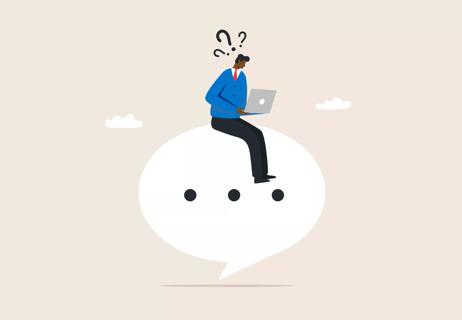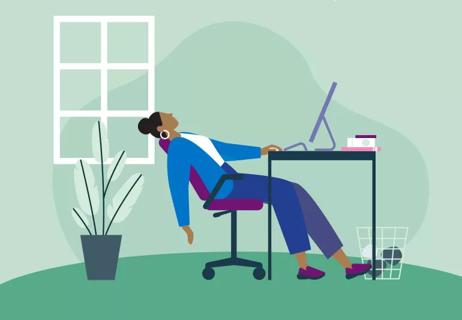Don't despair — it's a common problem with many causes

Do you awaken in the morning feeling tired? Do you drag yourself through the day wondering if you’ll ever have enough energy to feel good? Maybe you feel okay, but you can’t walk very far without sitting to catch your breath.
Advertisement
Cleveland Clinic is a non-profit academic medical center. Advertising on our site helps support our mission. We do not endorse non-Cleveland Clinic products or services. Policy
Welcome to the world of heart-failure fatigue.
“Most of our patients are fatigued. It’s the bane of their existence,” says heart failure specialist David Taylor, MD.
Fatigue is a universal problem in heart failure. It affects patients with heart failure with preserved ejection fraction (HFpEF), but tends to be worse in those with heart failure with reduced ejection fraction (HFrEF).
“These patients have lower cardiac output, which means not as much oxygen and blood are going to the brain and muscles,” says Dr. Taylor.
That being said, there are other reasons why heart-failure patients may feel fatigued: The beta-blockers used to treat heart failure are a common cause.
Deconditioning, depression, poor sleep and a poor diet can cause fatigue too. “All these issues must be addressed,” he says.
The anti-adrenaline effect of beta-blockers — the very quality that makes them valuable for treating heart failure — can make patients feel tired.
Most patients do not experience any side effects. But if you feel fatigued after starting your medicine, it’s important to do two things: Keep taking your medicine, and report your symptoms to your doctor. If you stop suddenly, you may risk having rebound adverse effects.
Advertisement
According to Dr. Taylor, understanding why beta-blockers must be taken often makes it easier to deal with this side effect. “Once patients know the drug will improve their heart function, help them stay out of the hospital and live longer, most are willing to put up with a little fatigue,” he says.
You and your physician can try to figure out if the symptoms are really a side effect or due to your heart problem or even possibly due to an unrelated condition such as sleep apnea. Usually, we’ll adjust the medication dose or switch to an alternative medication and check if the side effects go away with time.
If he is able to wean the patient down or off the drug, and fatigue remains a problem, the beta-blocker is not to blame.
Depression can be a reaction to the diagnosis of heart failure, but it can also be triggered by beta-blockers.
“When this happens, we switch beta-blockers to see if we get improvement or treat the depression with antidepressants,” says Dr. Taylor.
It is not uncommon for heart failure patients to develop anemia. Iron supplements or a drug that helps the body absorb iron can be used to restore blood iron levels and improve energy levels.
If you feel exhausted after a bad night, imagine that every night is a bad night. Then you’ll know how people with sleep apnea feel every day.
Sleep apnea causes people to awaken hundreds of times a night, preventing them from getting deep, restorative sleep. Sleep apnea is common in heart failure. Once it is diagnosed, using a continuous positive airway pressure mask at night can restore a normal sleeping pattern and increase daytime energy.
As heart failure advances, some patients may not be able to breathe when they lie flat. This can interfere with normal sleep. Your heart failure specialist can show you several sleeping positions that may make breathing and sleeping easier.
Your instinct may be to “baby” a heart damaged by heart failure, but the opposite is true.
“Aerobic exercise strengthens all muscles in the body, including the heart,” says Cardiac Rehabilitation Director Erik Van Iterson, PhD.
“A heart that pumps more strongly increases the delivery of oxygenated blood throughout the body, which your body needs to generate energy and battle fatigue. You can actually make yourself worse by doing nothing.”
A cardiac rehabilitation program and guided exercise training therapy can put you on the right track, both physically and mentally. “All heart failure patients need cardiac rehab,” he says.
If you were not raised in a culture that promoted exercise, you may find the concept intimidating. Dr. Van Iterson emphasizes that any exercise you do will be beneficial.
Advertisement
“Exercise means different things to different people. There is no one-size-fits-all model to follow,“ he says.
Attending a cardiac rehab program enables you to be assessed for the type of exercise that will be safe based on your age, experience, overall condition and the condition of your heart. “You may never have thought that walking around your neighborhood would be beneficial, but if you are — for example — in your mid-70s, have heart failure and have never exercised before, it will be,” says Dr. Van Iterson.
The goal is to move your body for a total of 30 to 60 minutes a day. You may need to ease into this goal by moving in shorter increments throughout the day, if that’s all you can tolerate. “If you need a walking assist device, that’s fine,” he says. “You will be able to tolerate more exercise over time.”
Be patient and stay motivated. You won’t feel better overnight. “It may take weeks or months of consistent exercise to feel the difference,” says Dr. Van Iterson.
It’s no secret that heart failure can steal your appetite. The food choices you make, as well as your eating habits, can affect your energy level and quality of life.
Here, preventive cardiology dietitian Julia Zumpano, RD, LD, offers 8 tips for adopting a heart-healthy diet:
Advertisement
Advertisement
This article was adapted from Cleveland Clinic Heart Advisor.
Learn more about our editorial process.
Advertisement

Drink some water, take a little walk, step away from your computer and chat with a coworker, or even your toddler, to help ward off daytime sleepiness

What’s on your plate can either help power you through your day or put you in nap mode

Eating turkey is only a small part of the reason you want to take a nap

Carve out time for yourself — and cut down the number of decisions you make each day

If you’re worn down and sluggish, it can be more than just feeling exhausted

Sleepiness and lack of energy aren’t the same thing

Practical solutions for fighting flagging energy

Don’t be misled by bogus answer to fatigue

Wearing a scarf, adjusting your outdoor activities and following your asthma treatment plan can help limit breathing problems

Your diet in the weeks, days and hours ahead of your race can power you to the finish line

When someone guilt trips you, they’re using emotionally manipulative behavior to try to get you to act a certain way